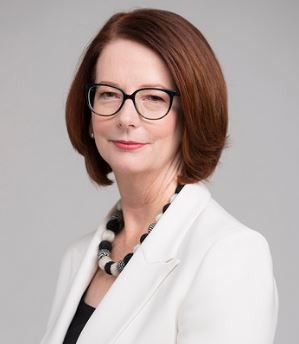Europa/ReinoUnido/Prensaglobalpartnership.org
Resumen: Julia Gillard, ex primer ministro de Australia, y Presidente de la Asociación Mundial para la Educación(GPE), dice que la crisis global de la educación tiene que estar en la parte delantera de las mentes de los líderes mundiales. «Los primeros ministros y presidentes necesitan ver la educación como una inversión necesaria, similar a las inversiones que realizan en la infraestructura nacional y la defensa.» . En su intervención en la London School of Economics , Gillard describe una crisis global de aprendizaje en el que 263 millones de niños en edad escolar primaria y secundaria están fuera de la escuela y sólo uno de cada diez niños en los países de bajos ingresos recibirán más que una educación primaria básica.
London, May 22, 2017 – Julia Gillard, former Australian Prime Minister and Chair of the Global Partnership for Education (GPE), says the global education crisis needs to be at the front of the minds of world leaders.
«Prime ministers and presidents need to see education as a necessary investment, akin to the investments they make in national infrastructure and defence.»
Speaking at the London School of Economics, Gillard described a global learning crisis in which 263 million children of primary and secondary school age are out of school and only one in ten children in low-income countries will receive more than a basic primary education.
«Without immediate and radical action to invest more in education, over half of the world’s upcoming youth generation – 825 million of the 1.6 billion young people who will be alive in 2030 – will simply not be equipped to work and thrive in the 21stCentury. The ones who miss out will be defined by pre-existing patterns of poverty.»
«Condemning hundreds of millions of children to a dismal future, regardless of their aptitude is a huge injustice, a violation of basic human rights and poses significant risks.»
Gillard described investment in inclusive, quality education as «foundational» to the sustainable development agenda, economic growth and security, «the clearest pathway for nations to leave poverty and aid dependence behind».
«If we want to reduce armed conflict and stem irregular migration flows, equitable access to quality education is essential.»
«Quality education for all matters whether you are a business leader searching for talent, a security analyst fretting over the risk of conflict, a voter who worries about rising numbers of asylum seekers, or a feminist who admires Malala’s courage. I am convinced that people everywhere are able to embrace the education agenda.»
The Global Partnership for Education is seeking US$3.1 billion from international donors to invest in improving learning quality and access to education in 89 developing countries that are home to 78 percent of the world’s out of school children. GPE aims to scale up its funding base to US$2 billion a year by 2020 and US$4 billion by 2030.
«We have an opportunity to start an ambitious scale up and deliver the step-change that is needed in global education financing. But to realise the promise of this moment, we need to put the global education crisis – and the opportunity to fix it – at the front of the minds of world leaders.»
Gillard said that the UK can put the case for education «powerfully» to the world and that there has been a clear recognition in the UK’s own aid priorities that education matters.
However, she pointed out that the vast majority of funds for education would come from developing countries themselves, and GPE supports them to develop robust national education sector plans, funded by domestic resources as well as new mechanisms to catalyse co-financing for investment in education.
«The old ways of doing aid, where a small number of donor country governments write the lion’s share of grants for developing countries, just will not be enough.»
***
The Global Partnership for Education (GPE) works with developing countries to ensure that every child receives a quality basic education, prioritizing the poorest, the most vulnerable and those living in countries affected by fragility or conflict. GPE mobilizes financing for education and supports developing countries to build effective education systems founded on evidence-based planning and policies.
GPE’s support has achieved the following results in its partner countries:
- 64 million more children in primary school in 2014 compared with 2002
- 73% of children in GPE partner countries completed primary school in 2014 compared to 63%in 2002.
- 71% primary school completion rate for girls in 2014 compared with 56% in 2002
- Between 2002 and 2013, GPE partner countries increased their education budgets from 15.2% to 16.6% of total government expenditure, more than three times the average increase in all low and middle-income countries.
MEDIA CONTACTS:
Katy Cronin (London): katycronin@globalpartnership.org +44 7788 710 789
Alexandra Humme (Washington DC): ahumme@globalpartnership.org +1 202 458 5511
Fuente: http://www.globalpartnership.org/news-and-media/news/julia-gillard-immediate-and-radical-action-needed-invest-more-education-worlds-children







 Users Today : 20
Users Today : 20 Total Users : 35460037
Total Users : 35460037 Views Today : 28
Views Today : 28 Total views : 3418659
Total views : 3418659